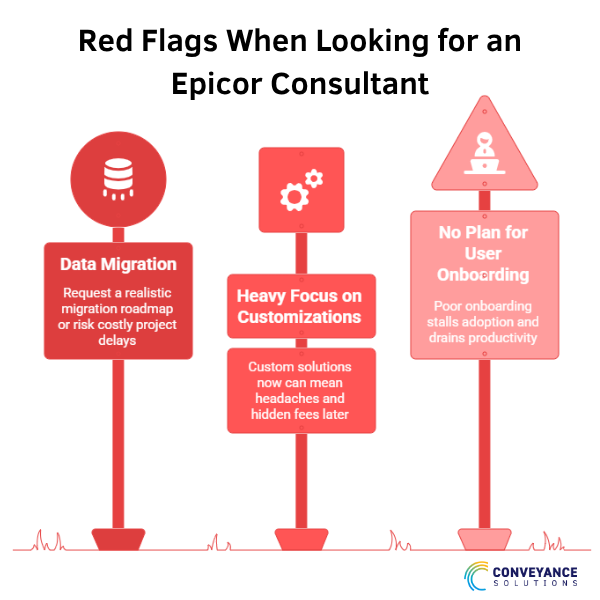You can run a complex distribution business with outdated tools, but your margins and productivity will eventually show the strain. That’s where an Epicor consultant steps in.
What is an Epicor Consultant?
An Epicor consultant is an ERP expert and Epicor software specialist who understands how to turn disconnected data, inefficient workflows, and manual processes into a seamless, automated system that supports your business goals.
You get a guide who knows every part of the Epicor ecosystem, from initial planning to real-world deployment and everything in between.
These experts assess your processes, recommend improvements, and deliver solutions that fit your specific business, not a generic template. With an Epicor consultant, you’re not just buying technical skills. You’re getting a partner committed to operational improvement, higher efficiency, and measurable business value.
Is there a difference between an Epicor Consultant and an Epicor Partner?
An Epicor consultant provides targeted advice, optimization, and customization for your ERP system. Some work independently, while others join larger consulting teams focused on your project goals.
Epicor partners come in two forms: Reseller (VAR) and Service partners. Resellers, like Conveyance Solutions, handle both software sales and full-cycle services from Prophet 21 implementation to ongoing support. You get one point of contact for everything.
Professional services partners deliver implementation, training, and ongoing help. They do not sell or license the software.
A partner supports your business long term. A consultant usually handles project-based needs. Both add value, but their roles and commitments differ.
What to Expect From an ERP Consulting Firm
When you bring on an ERP consulting firm, you should expect more than just technical assistance. You get a one-team approach, from blueprinting to long-term optimization.
Implementation Support
A professional team will walk you through Epicor ERP implementation with detailed project plans, thorough business process reviews, and reliable go-live support. You should receive proactive guidance on testing, data migration, and risk mitigation to set you up for a smooth launch.
Customization & Development
Your business isn’t generic, so your software shouldn’t be either. Expect targeted Epicor customization with industry-specific add-ons and modules that fit existing workflows. A good consultant will prioritize tailoring features, integrations, and reporting so your teams aren’t battling workarounds.
Training & User Adoption
Effective Epicor user training helps your staff build confidence with the new system. Onboarding should include hands-on sessions, user support materials, and tailored onboarding, so your team is productive from day one and resistant to change drops dramatically.
Ongoing Maintenance and Optimizations
A consulting relationship doesn’t end at go-live. Expect regular check-ins, system health audits, and new feature recommendations so your investment keeps pace with business growth. Look for a firm that’s available for ongoing ERP services, prompt troubleshooting, and continual process refinement.
How to Choose the Best Epicor Consultant for You
The stakes are high for distribution companies investing in ERP. To find a certified consultant with real industry experience and ERP expertise, use this guide.
True Process Immersion
Great Epicor consultants don’t just deliver technical recommendations. They are entrenched in your daily operations to understand how your business truly functions.
The right firm invests time in shadowing teams, reviewing workflows, and identifying behind-the-scenes gaps that generic solutions often miss. This level of involvement leads to tailored strategies: solutions are mapped directly to real bottlenecks, and optimizations support the specific ways your teams work, not just how the software can work.
When a consulting partner becomes a true extension of your company, you can count on decisions and configurations that drive lasting improvements.
Experience with Epicor ERP Systems
Check for proven experience across a variety of Epicor projects from everything around implementation, rescue, upgrades, and migrations to ongoing maintenance and end-user training.
Industry-specific Expertise
Your provider should have demonstrated success within distribution, manufacturing, or your specific vertical. This ensures best practices are aligned with real-world needs, not just abstract software knowledge.
Implementation Expertise
Look for consultants who can show a smooth history of go-lives with documented project plans, risk controls, and measurable uptake rates.
Transparent Case Studies and Success Stories
Partners should share relevant case studies showing quantifiable results—reduced inventory errors, lower cycle times, or audit-ready financials.
Responsiveness and Team Location (Onshore vs Offshore)
Confirm if the team is available during your business hours and whether you’ll have onshore support for urgent issues or long-term collaboration.
End-user Training
Go beyond handbooks. The right team offers tailored end-user training and resources that address each role in your business.
Ongoing Maintenance and Support
Your partner should offer continued system optimization and accessible expertise long after go-live.
Red Flags When Looking for an Epicor Consultant
Pick a team that is transparent about these long-term commitments. Knowing what to expect upfront helps you avoid budget surprises and keeps your Epicor ERP running smoothly.
Don’t Overlook Data Migration Challenges
Your team already manages daily work, and adding data conversion can stretch resources thin. This often means missed deadlines and paying for two systems while the Epicor ERP sits idle until migration is finished.
Ask every consultant how they quote and handle data migration. If most work falls on your staff or the quote is unusually low, delays and extra costs can follow. Insist on a clear, realistic plan for this phase.
Related reading: How to Clean Up Data in P21 Cloud-Hosted Environments [+ Example SQL Queries to Steal]
The Hidden Costs of Customizations
Be cautious when consultants recommend custom solutions as the first option. Every customization comes with extra responsibilities for your business.
Ongoing maintenance, user testing, and future upgrades are often handled by your internal team rather than the vendor. If you do not have a clear onboarding roadmap and strong training plan, costs can quickly spiral, and software changes may bring unexpected headaches.
No Clear Plan for User Onboarding
If a team cannot show a simple, role-based onboarding plan, adoption will stall. Users need clear steps, timelines, and access to support to build confidence and avoid rework.
Look for structured training by role, documented processes, and live support during the first weeks on Epicor. Without these basics, productivity dips, tickets pile up, and go-live dates slip.
Why Choose Conveyance Solutions
Industry leaders trust Conveyance Solutions as an Epicor platinum partner for proven results, distribution expertise.
With 20+ years of hands-on experience, our U.S.-based team delivers consistent, white-glove support that never leaves you to fight support tickets alone.
You get one dedicated team from sales through optimization, shaping process improvements, integrations, and ROI-driven upgrades for midmarket and enterprise distributors.
We don’t disappear after launch. Our experts build your roadmap together and stay involved for the long run.
Contact Us for Epicor Consulting
Ready to talk about your Epicor support and ERP services? Get answers from seasoned experts, a transparent process, and a detailed project plan for before and after go-live.
Frequently Asked Questions on Epicor Consultants
What does support look like after the implementation?
After implementation, Epicor users have access to daily helpdesk support from 8 a.m. to 8 p.m. local time, along with an extensive knowledge base of common solutions and “how-to” resources. The Epicor Learning Center offers guided learning paths, assignable courses, and step-by-step tutorials.
The P21 Worldwide User Group also offers a helpful form where users can help one another with issues and offer support with local events and annual conferences. For special projects, Conveyance Solutions provides on-demand support and expertise to keep your system running smoothly.
How long does Epicor implementation take?
A standard deployment for midmarket distribution typically lasts at least 6 months, depending on customization, data conversion required, and integrations. Larger and multi-site rollouts usually have a 12-month implementation commitment or longer.
Can Epicor consultants work remotely?
Yes. Many Epicor ERP experts provide remote and on-site support, ensuring flexibility for distributed teams and multi-location rollouts.
What is the difference between an Epicor partner and an independent consultant?
Epicor certified partners collaborate with Epicor to offer formal (often broader) implementation and support services, while independent consultants specialize in focused expertise or short-term projects. Certified partners also have direct access to Epicor professional services, sales, and product development.
What does successful implementation look like, and how long will it take?
Success means your system is live, processes are streamlined, end-users are trained, and measurable improvements are achieved—usually within the timeline set at project kickoff.
What happens if you don’t hire an ERP consultation firm?
Although some companies have in-house teams or “special projects” staff with ERP experience, partnering with Epicor-certified partners brings added value. Most organizations undergo an ERP migration only a handful of times, but Epicor partners work with these systems every day.
Ready to see the difference a Platinum Partner can make?
Learn more about how we can help make data work better for you.



